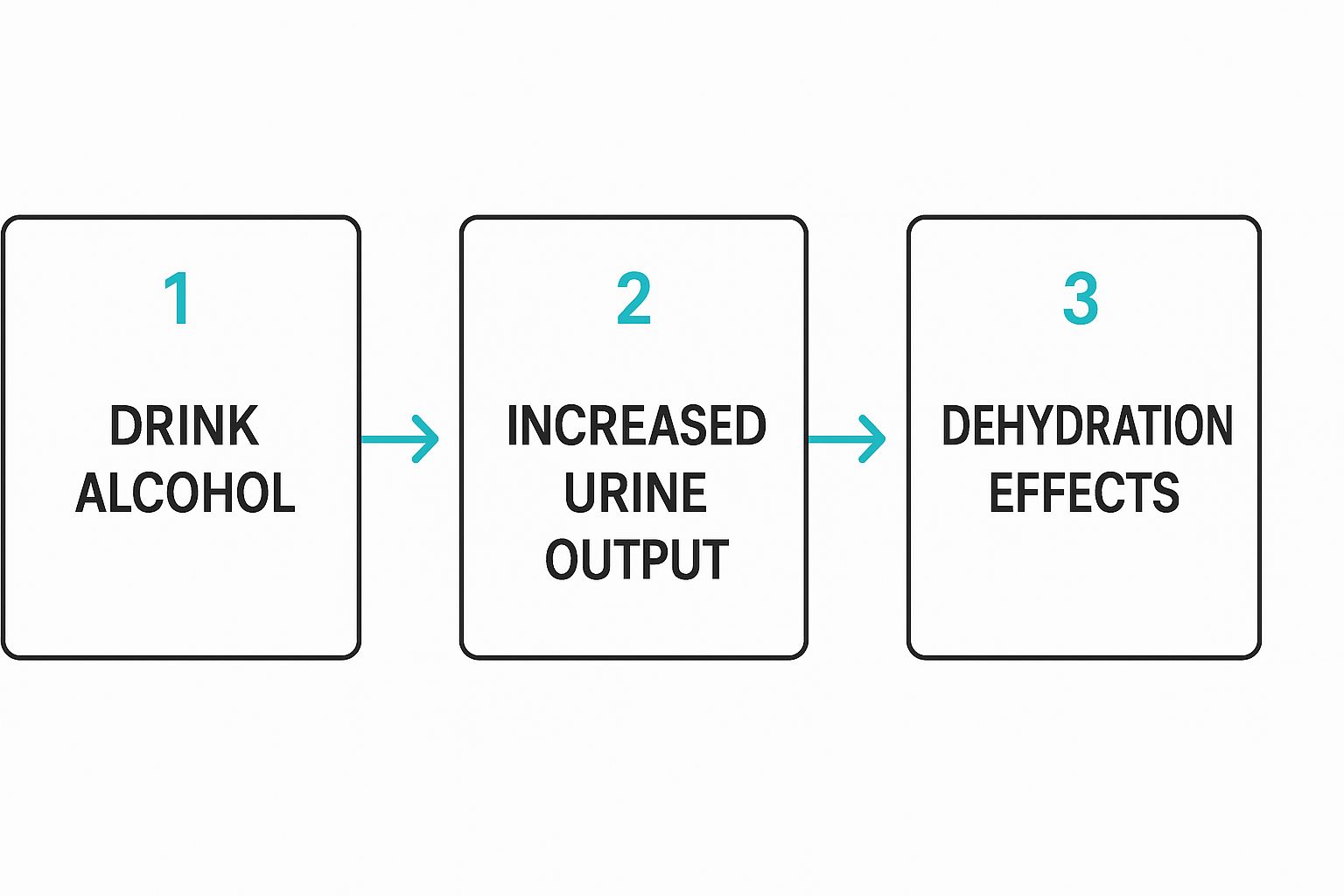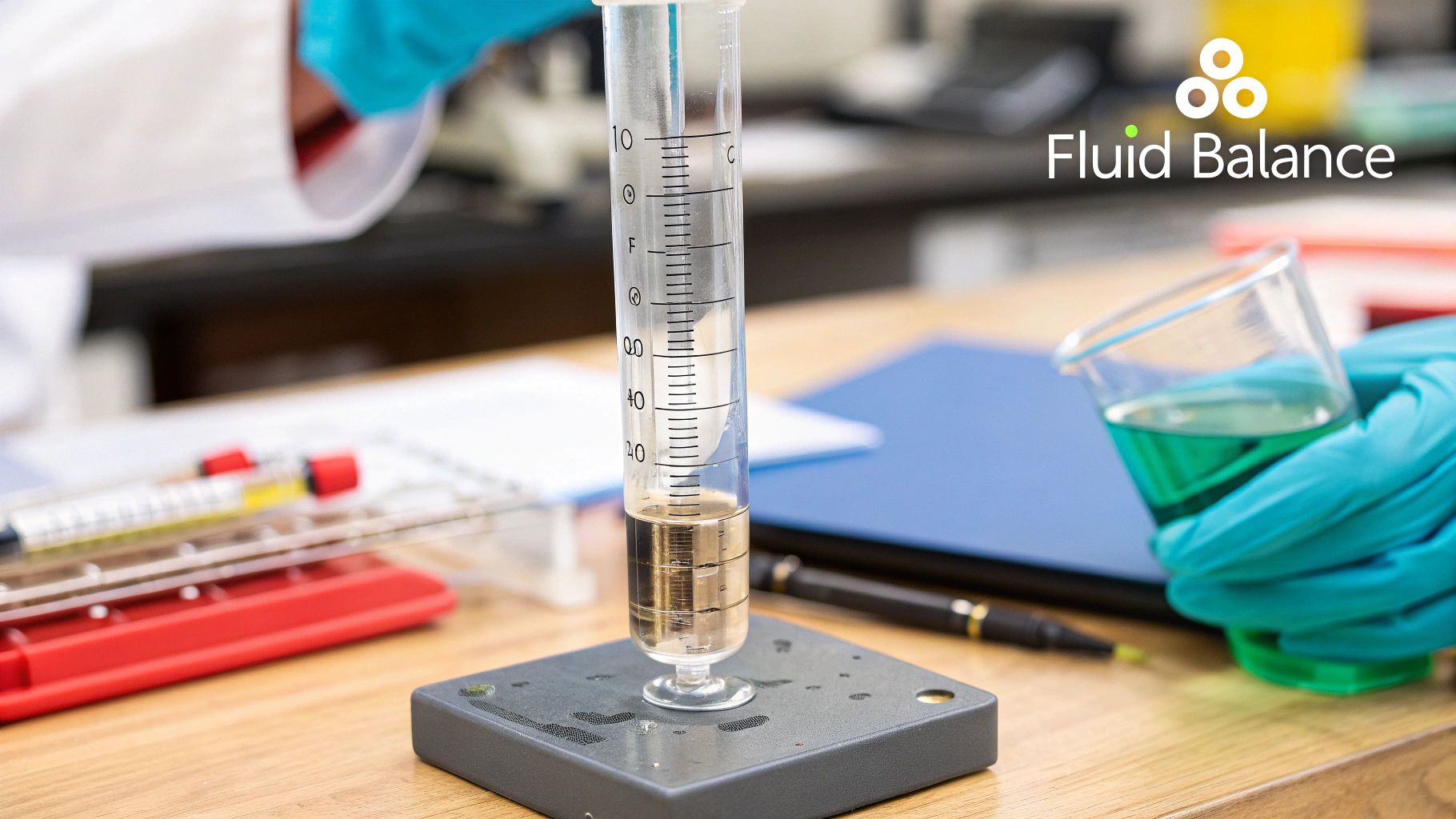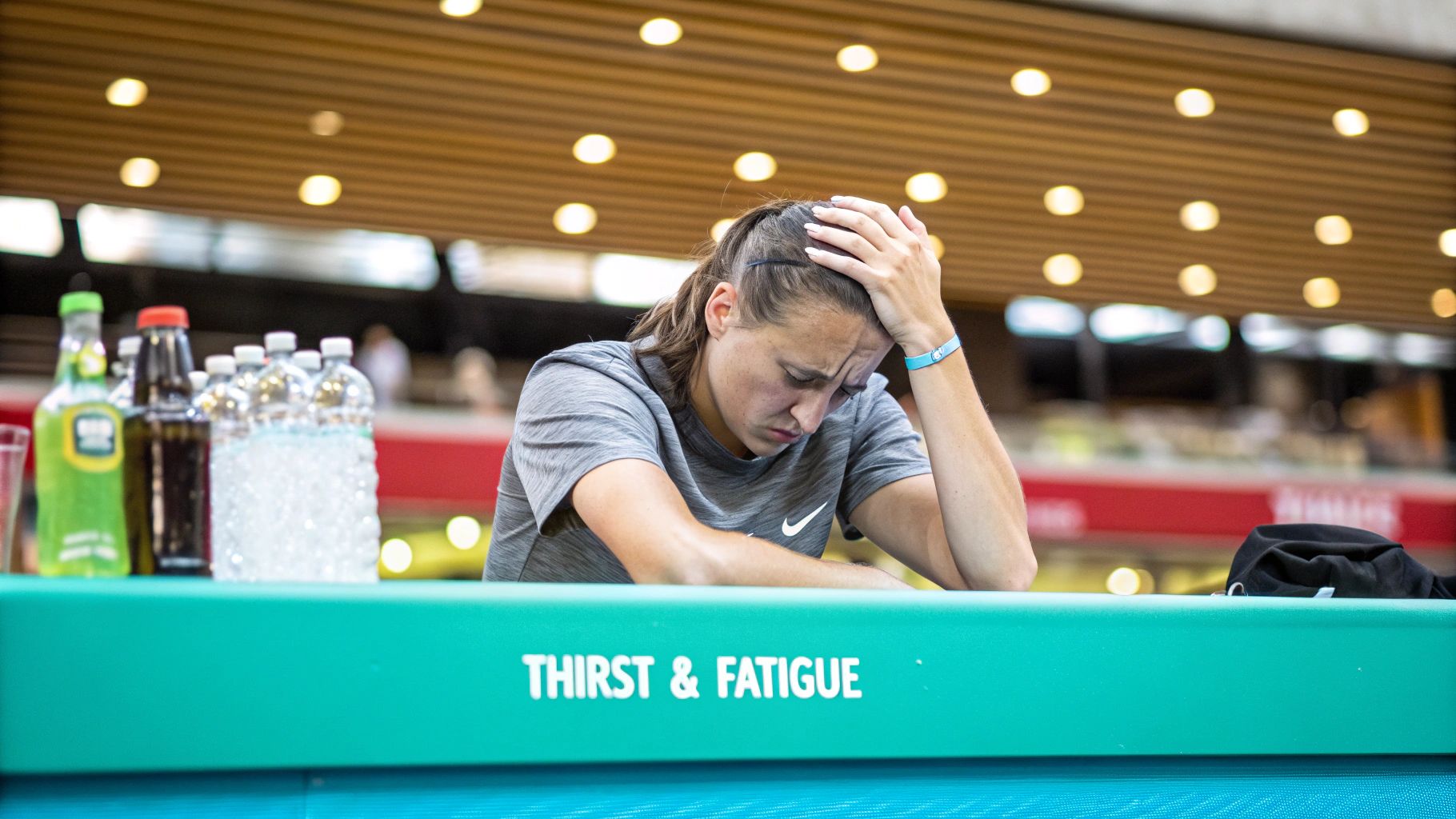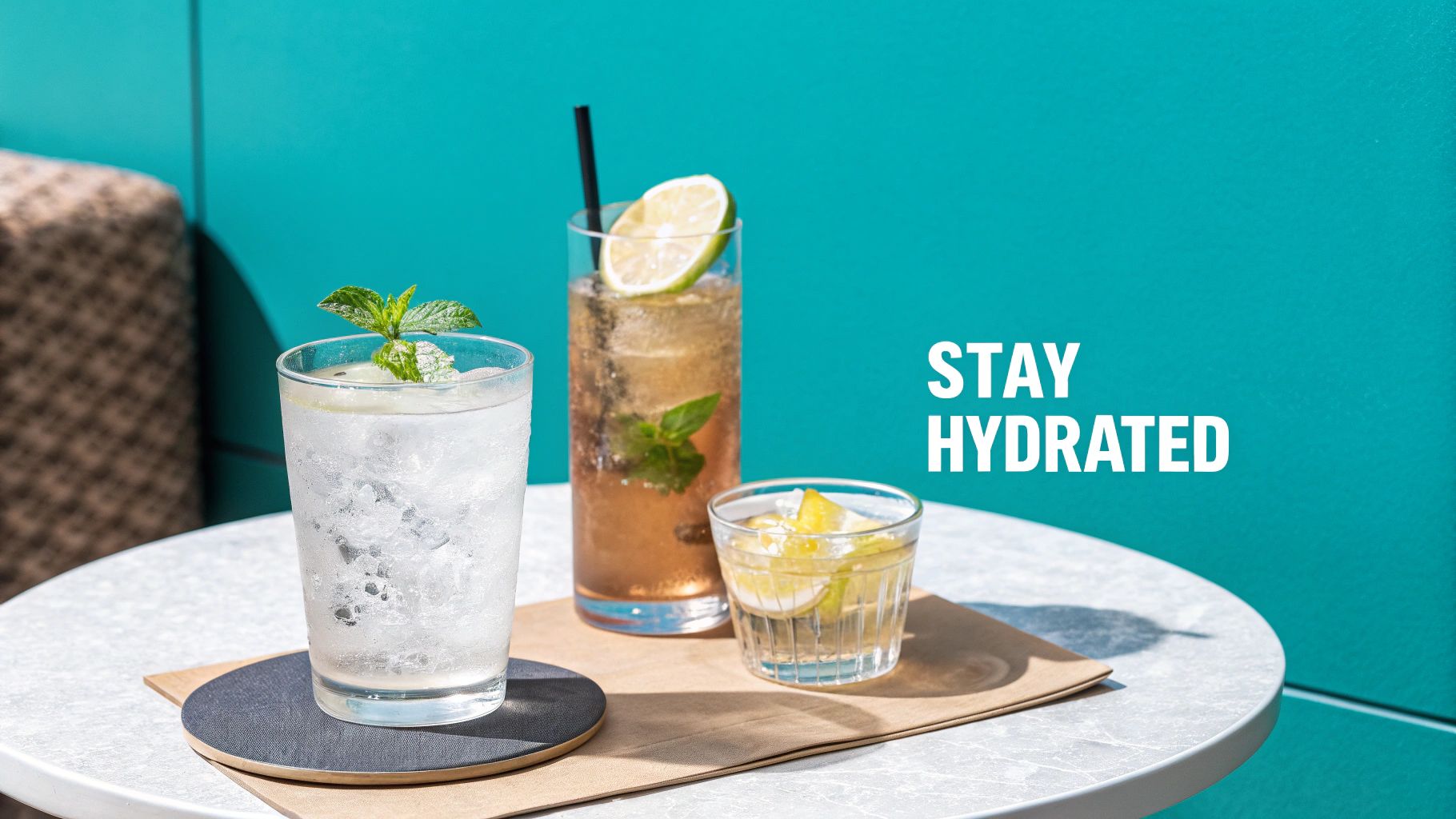

· By Annemarie
Is Alcohol Dehydrating? Know the Hidden Effects on Your Body
What Really Happens When Alcohol Meets Your Kidneys
Think of your kidneys as the expert water managers for your body. They work tirelessly behind the scenes to keep your fluid levels perfectly balanced, much like a master plumber maintaining a complex system. When you introduce alcohol, however, it’s like throwing a wrench into this finely tuned operation by messing with a critical hormone signal. This disruption is the core reason why the answer to "is alcohol dehydrating?" is a resounding yes.
This process visualization shows the simple but impactful chain reaction.

The infographic clearly lays out how that first drink triggers a cycle of fluid loss, which is what leads to those all-too-familiar feelings of dehydration.
The Vasopressin Shutdown
The primary target of alcohol's interference is a vital hormone called vasopressin, also known as antidiuretic hormone (ADH). Under normal circumstances, your brain releases vasopressin to signal your kidneys to reabsorb water, keeping you hydrated. It’s essentially the body’s "hold onto water" command.
But alcohol steps in and suppresses the release of vasopressin. When this signal gets blocked, your kidneys never receive the memo to conserve water. Instead, they get the green light to send water straight to your bladder for removal. This is precisely why you find yourself making more frequent trips to the restroom soon after your first drink. It’s not just about the liquid in your glass; your body is being tricked into flushing out more water than it should.
The Math of Fluid Loss
This hormonal meddling creates a very real fluid deficit. Studies have shown that for every 200 milliliters of a drink like beer (with about 5% alcohol), your body can push out around 320 milliliters of urine. You're losing significantly more fluid than you're taking in. This effect is what makes alcohol a diuretic—a substance that increases urine production and forces your body to shed fluids faster. Understanding this mechanism is key to grasping the surprising reasons behind alcohol-induced dehydration. You can find more details about the role of vasopressin from the experts at Healthline.com.
This cycle of fluid loss explains why even a moderate night of drinking can leave you feeling parched and run-down the next day. Your body’s internal plumbing is temporarily rewired to dump water instead of saving it, which is the perfect setup for dehydration. To learn more about this process, check out our complete guide on why alcohol dehydrates you.
When Your Brain Gets Caught In The Crossfire
 While your kidneys are busy managing the body’s plumbing, your brain feels the immediate shock of a fluid imbalance. The brain, which is made of about 75% water, is extremely sensitive to changes in hydration. When alcohol’s diuretic effect starts draining this crucial resource, it creates a double-whammy for your mental function. You’re not just dealing with alcohol’s direct influence on your neurons; you’re also forcing your brain to work in a low-fluid state.
While your kidneys are busy managing the body’s plumbing, your brain feels the immediate shock of a fluid imbalance. The brain, which is made of about 75% water, is extremely sensitive to changes in hydration. When alcohol’s diuretic effect starts draining this crucial resource, it creates a double-whammy for your mental function. You’re not just dealing with alcohol’s direct influence on your neurons; you’re also forcing your brain to work in a low-fluid state.
Imagine your brain as a high-performance computer running complex software. Proper hydration is the cooling system that prevents it from overheating and slowing down. When alcohol is dehydrating your system, it's like slowly draining that essential coolant. The first thing you'll notice is a drop in mental sharpness, which often shows up as brain fog, trouble concentrating, or just feeling sluggish.
The Impact on Cognitive Performance
This team-up of alcohol and dehydration doesn't just make you feel "off"—it actively gets in the way of critical brain functions. Your ability to process information, make solid judgments, and react quickly all take a major hit. That mental haze you feel is a direct symptom of your brain cells, or neurons, struggling to talk to each other without enough water.
A controlled scientific study confirmed this dangerous combination. Researchers observed that while alcohol alone hindered cognitive tasks, the problems were much worse when people were also dehydrated. This duo led to a more serious decline in:
- Reaction Times: How fast you can respond to things happening around you.
- Executive Function: Your ability to plan, focus, and juggle multiple tasks.
- Response Inhibition: The power to stop yourself from making a knee-jerk decision.
This research shows that staying hydrated isn't just about avoiding a headache; it’s about protecting your core mental abilities. You can explore the study's full findings on how dehydration amplifies alcohol's effects for a deeper dive into the science.
Real-World Consequences
This mental slowdown has real, tangible consequences. At work, it might look like a dip in productivity or an increase in small mistakes after a night of drinking. More seriously, it dramatically affects activities like driving, where split-second decisions are the difference between safety and disaster. Knowing your body's processes is a key part of responsible drinking, and our guide on how alcohol is metabolized can offer more insight.
Ultimately, the brain fog that so often comes with drinking is a clear distress signal. It’s a warning from your brain that the one-two punch of alcohol and dehydration is creating a hostile environment for thinking clearly.
Reading Your Body's Dehydration Warning System

Your body has an internal alarm for dehydration, but the first signals are usually more like quiet whispers than blaring sirens. It’s easy to brush off these initial clues, blaming them on the alcohol itself. Learning to recognize these messages, however, gives you an advantage—it helps you spot fluid imbalances early on, before they turn into the more serious symptoms of being dehydrated.
Think of it as a gradual process, not an on/off switch. Your body doesn't just suddenly become dehydrated. The first signs are subtle and easy to ignore when you’re out having a good time. You might notice you’re a little extra thirsty, a faint headache is starting to brew, or your mouth feels a bit dry and sticky. These are your body's first attempts to signal that its fluid levels are dropping. It's important to know that alcohol is dehydrating your system from the very first drink, even if you don't feel it right away.
Early vs. Late Stage Symptoms
It’s crucial to know the difference between your body’s early whispers and its later shouts. Paying attention lets you be proactive about your health instead of just dealing with the aftermath.
To help you better identify where you might be on the dehydration scale, we've broken down the symptoms by severity. This can help you recognize the early signs and take action before things get worse.
| Severity Level | Physical Symptoms | Cognitive Symptoms | When to Seek Help |
|---|---|---|---|
| Mild | Increased thirst, dry mouth, darker yellow urine, slight fatigue or sluggishness. | Feeling a bit "off" or less focused than usual. | These are early warnings. It's a good time to start rehydrating with water or a supplement. |
| Moderate | Persistent headache, significant fatigue, dizziness, muscle cramps, infrequent urination, very dark yellow or amber urine. | Irritability, trouble concentrating, noticeable brain fog. | You should take immediate steps to rehydrate. If symptoms don't improve with fluid intake, monitor closely. |
| Severe | Extreme thirst, no urination for 8+ hours, rapid heartbeat, rapid breathing, sunken eyes, very dry skin that doesn't bounce back when pinched. | Confusion, delirium, fainting, or loss of consciousness. | This is a medical emergency. Seek immediate medical attention. |
Recognizing this progression is key. That initial tiredness or mild headache isn't just a sign you're "getting tipsy"; it's a direct signal from your body that it’s losing fluids and needs support. By catching these signs early, you can take simple steps—like drinking more water or using a hydration aid like Upside—to get back on track before the more uncomfortable symptoms set in.
Why Your Drink Choice Matters More Than You Think
 Not all alcoholic drinks are created equal when it comes to hydration. The choice between a light beer, a glass of wine, or a strong cocktail is about more than just taste—each one interacts with your body’s fluid balance in a distinct way. Understanding these differences is crucial, as what you choose to drink can either work with or against your body's efforts to stay hydrated.
Not all alcoholic drinks are created equal when it comes to hydration. The choice between a light beer, a glass of wine, or a strong cocktail is about more than just taste—each one interacts with your body’s fluid balance in a distinct way. Understanding these differences is crucial, as what you choose to drink can either work with or against your body's efforts to stay hydrated.
Think of it like choosing fuel for a car. While different types of fuel might get the engine running, some are much harder on the system than others. The main factor here is the alcohol by volume (ABV), which is simply the concentration of alcohol in your drink. A higher ABV means you're taking in more pure alcohol with less water, which ramps up the diuretic effect on your kidneys. This is the core reason alcohol is dehydrating your system more severely with certain drinks.
The Role of Drink Composition
Beyond just the alcohol percentage, the total volume and makeup of your drink play a big part. A standard 1.5-ounce shot of liquor (around 40% ABV) sends a much stronger diuretic signal to your body than a 12-ounce light beer (around 4-5% ABV). Even though the beer has much more liquid, the liquor's concentrated alcohol triggers a more aggressive loss of fluid compared to its small volume.
The other ingredients in your drink also matter a great deal. Sugary mixers, common in many popular cocktails, can actually draw water into your intestines, making the dehydration problem worse. This means a sweet margarita can be a double-whammy: it's high in alcohol and packed with sugar. In contrast, a drink with less alcohol and more water, like a wine spritzer, is often a more forgiving choice.
Hidden Factors: Congeners and Mixers
The type of alcohol you drink contains other compounds that can affect how you feel the next day. Congeners are substances created during the fermentation process that give drinks like whiskey and red wine their unique flavors and aromas. These darker liquors are rich in congeners and have been linked to more intense after-effects, which can feel a lot like severe dehydration.
Choosing your drink wisely means looking at the whole picture: alcohol content, mixers, and overall volume. This knowledge allows you to make smarter decisions, helping you enjoy yourself while minimizing the dehydrating impact of alcohol.
To help you see how different drinks stack up, we've put together a quick comparison.
Alcohol Types and Their Dehydration Impact
Comparison of different alcoholic beverages showing alcohol content, typical serving sizes, and relative dehydration risk
| Beverage Type | Alcohol Content | Typical Serving | Dehydration Risk | Hydration Tips |
|---|---|---|---|---|
| Light Beer | 4-5% ABV | 12 oz | Low | Has a higher water content. A good choice for moderation. |
| Red/White Wine | 12-15% ABV | 5 oz | Moderate | Higher ABV than beer. Alternate with glasses of water. |
| Hard Liquor (Neat) | 40% ABV | 1.5 oz | High | Highly concentrated alcohol. Chase with water or a non-sugary mixer. |
| Sugary Cocktail | 15-40% ABV | 6-8 oz | Very High | A double threat from alcohol and sugar. Opt for low-sugar mixers. |
As the table shows, a sugary cocktail poses the biggest risk due to its combination of high alcohol content and sugar. On the other end, a light beer is generally the least dehydrating option. Being mindful of these differences can help you make better choices for your body.
The Athletic Performance Wild Card Nobody Talks About
For anyone who leads an active life, combining exercise and alcohol can create a perfect storm for dehydration that many people simply don't see coming. Think of your body as a high-performance engine. After a tough workout, it’s already running hot from the effort and losing fluid through sweat. Drinking alcohol at this point is like trying to cool that engine with a liquid that actively drains its coolant. This is because alcohol is dehydrating right when your body is most desperate to rehydrate.
That celebratory post-game beer or weekend-warrior cocktail might feel well-deserved, but it can secretly sabotage your body’s recovery. The diuretic effect of alcohol signals your kidneys to flush out precious fluids, working directly against your rehydration efforts and putting the brakes on muscle repair.
Timing Your Recovery
The timing and type of alcohol you drink after exercise make a huge difference. If you've just wrapped up a strenuous activity, your body is already in a state of exercise-induced dehydration. Grabbing a standard alcoholic drink can make this situation much worse.
Research brings this risk into focus, showing that beverages with 4% alcohol or more seriously slowed down blood volume recovery and increased urine output after exercise. However, the same study found that drinks with very low alcohol content (up to 2%) had a minimal diuretic effect and didn't really get in the way of rehydration. You can learn more about these specific findings on post-exercise rehydration to dig into the science. This essentially means an ultra-light beer might not hurt your recovery, but a standard beer or glass of wine definitely could.
Smarter Choices for Active Lifestyles
This doesn't mean you have to choose between being active and enjoying a drink. It’s all about being strategic. First and foremost, prioritizing rehydration with water and electrolytes is non-negotiable.
Giving your body a head start on recovery is key. By waiting at least an hour or two after your workout before having an alcoholic beverage, you allow your system to begin its repair process. By understanding how alcohol interferes with your body's needs after exercise, you can make smarter decisions that support both your fitness goals and your social life, ensuring one doesn't cancel out the other.
Game-Changing Strategies That Actually Work
You’ve probably heard the old advice: drink a glass of water between every alcoholic beverage. It’s a decent starting point, but it often doesn't cut it because it fails to tackle the real reason alcohol is dehydrating your body. To genuinely feel better, you need a smarter plan—think of it as moving beyond a simple band-aid to using a complete first-aid kit. This means paying attention to timing, electrolyte balance, and using the right tools for support.
A much better strategy is to front-load your hydration. Think of it like watering a plant right before a heatwave hits; if your body is already well-hydrated before you start drinking, it has a buffer to defend against alcohol's diuretic effects.
Beyond Basic Water: The Electrolyte Factor
While H2O is critical, it's only one piece of the puzzle. When you drink, your body doesn't just lose water; it also flushes out essential electrolytes. These are minerals like sodium, potassium, and magnesium that are basically your body's electrical grid, managing everything from muscle contractions to nerve signals. Guzzling plain water can actually dilute the electrolytes you have left, sometimes making you feel even worse.
This is where a more targeted approach really makes a difference. An effective plan needs to replenish these vital minerals along with the fluids you're losing.
Here’s a practical, step-by-step game plan:
- Pre-Hydrate with Purpose: A few hours before you start your night, drink water that’s been enriched with electrolytes. This preps your system for the fluid loss to come.
- Pace Yourself Intelligently: Instead of sticking to a rigid one-for-one rule, simply slow down your drinking. This gives your liver and kidneys a fighting chance to process the alcohol, which naturally dials down the diuretic signal.
- Plan Your Recovery Before You Start: The best time to act isn't the morning after, but before you even take your first sip. This proactive move supports your body when it needs it the most.
Choosing the Right Tools for the Job
This is where products specifically designed to help with alcohol consumption can be a total game-changer. Solutions like Upside Hangover Sticks are formulated with the specific nutrients your body loses when you drink, not just water. The super convenient jelly stick makes it easy to take before you go out, giving your system the herbal extracts, vitamins, and minerals it needs to counteract alcohol’s effects. It’s a modern solution for a common problem, taking you far beyond generic hydration advice.
By combining smart timing, electrolyte replacement, and targeted support, you can build a personal approach that works for you. This method doesn't just help with the symptoms of dehydration; it actively works to stop them from happening in the first place. If you want to find more ways to feel your best after a night out, check out our guide on quick hangover remedies.
Building Sustainable Habits For Long-Term Success
The goal isn't to turn every social outing into a complicated science project. Instead, it’s about creating smart, lasting habits that look after your health without killing the fun. Think of it as developing your own personal hydration philosophy—a set of go-to principles that become second nature, not a constant chore. This way, you can handle any social scene, from a casual hangout to a big celebration, with total confidence.
Building these habits means ditching some old myths. For instance, many people believe that every single sip of alcohol is continuously dehydrating your body. However, studies show that the diuretic effect is actually strongest after your first drink, and then your urine output tends to go back to normal. This doesn't mean you can forget about hydration, but it does shift the focus from frantically chugging water to using smarter, more consistent strategies.
Creating Your Realistic Routine
A sustainable plan is one that actually fits into your real life. It has to work with different environments and situations. Your hydration strategy shouldn't feel like a burden or make you that person who obsesses over every single sip. It's all about finding a practical rhythm that works for you.
Here’s how to build a routine that you'll actually stick with:
- Front-Load Your Fluids: Don't wait until you're already at the party. Start hydrating well in the hours before a social event. This gives your body a huge head start.
- Know Your Personal Limits: Pay close attention to how different types of drinks and amounts affect you. This self-awareness is your best defense against overdoing it and feeling awful later.
- Plan for the Environment: Are you drinking in the hot sun or a cool, air-conditioned bar? A beach party demands a much more serious hydration plan than a quiet dinner indoors. Always adjust your strategy to your surroundings.
Making Smart Choices Effortless
The real secret to long-term success is making smart choices feel easy. Keep hydration aids on hand so you don't even have to think about it. It’s about being prepared, not paranoid. By making these small, consistent actions a part of your life, you can enjoy alcohol while still putting your well-being first. This balanced approach is the most effective way to manage your health without missing out on life.
For an effortless way to support your body, try Upside Hangover Sticks. This convenient jelly is packed with the specific nutrients your body needs to help counter alcohol's effects. Just take one before you head out to give your system the proactive support it needs.
Ready to make your nights out better? Discover the benefits of Upside today!
